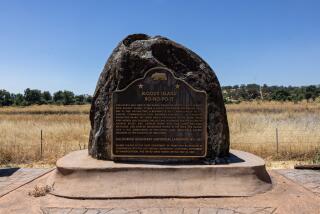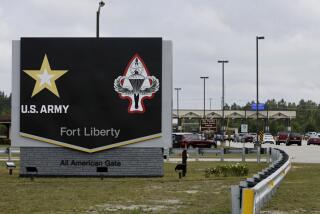A City Divided: St. Petersburg vs. Leningrad
- Share via
LENINGRAD, Soviet Union — Two days before a referendum on changing the name of their historic city back to St. Petersburg, several thousand people rallied Monday to support “Leningrad” and the Bolshevik leader for whom the city was named.
“We will defend the deeds and name of Vladimir Ilyich Lenin,” Yuri M. Lysenko, a representative of the Veterans of Labor, told the crowd gathered on historic Palace Square outside the Hermitage Museum. “We will stand up for Leningrad, and there will be a Leningrad for all eternity.”
About 5,000 people holding slogans such as “Lenin is with us, immortal and great” and “Comrades, let’s not let them rename Leningrad,” roared in approval.
The dispute over whether to return the city’s historic name has emerged as one of the most symbolic battles in the Soviet Union between forces pressing for a new democratic society and those who remain loyal to the ideals of the 1917 revolution, with the political and economic system created by the Bolsheviks after they overthrew the Russian monarchy.
On Wednesday, voters will decide in a non-binding referendum whether their city should be called Leningrad or St. Petersburg, and the city’s 4.5 million people are divided in half.
On one side, holding firm against changing the name, stand the Communist Party, many World War II veterans and the majority of residents over 60.
On the other side stand liberal members of the City Council, the Russian Orthodox Church, monarchists, most students and young people.
“It is not just the name we are fighting for--it is the moral, cultural and political atmosphere of our city,” said Vitaly Skoibeda, 30, the City Council member who led the drive for a referendum on restoring St. Petersburg. “Changing the name will show that we will never again let Communists rule here. We are returning to our cultural and historic traditions.”
A few hours before the pro-Leningrad meeting Monday evening in Palace Square, proponents of St. Petersburg--some wearing czarist uniforms--held a concert of Russian romantic songs to support the name change on the same square.
“The name of the saintly apostle Peter is infinitely more important to us than the Communist Party nickname of a person who destroyed the historic basis for our lives,” said Father Sergei P. Perikrestov, 33, a Russian Orthodox priest.
Lenin’s real name was Vladimir Ilyich Ulyanov, but he adopted the name Lenin for his revolutionary activities.
Although historic names have already been returned to many other cities, President Mikhail S. Gorbachev declared last week that renaming Leningrad would be going too far.
“The great city bears the name of a great man,” Gorbachev said in a statement published in the Communist Party newspaper Pravda. “V. I. Lenin has gone down in history as one of the greatest thinkers, politicians and statesmen of the 20th Century. The cause he fought for all his life is connected with the city on the Neva River.”
While Lenin has been harshly criticized in some of the liberal Soviet press, the Communist Party continues to encourage the personality cult of the Bolshevik leader, who died in 1924.
Gorbachev also echoed the strongest argument of Leningrad’s Communist Party leaders: “When hearing the word Leningrad, we recall heroic and tragic episodes in the people’s lives, their struggle against fascism and their victory in the Great Patriotic War.”
More than a million people died during a 900-day siege of Leningrad by German soldiers in World War II. Veterans, servicemen and Communist Party officials argue that renaming the city would be an affront to those who fought and died for Leningrad.
But Anatoly A. Sobchak, the head of Leningrad’s City Council, replies that returning the city’s original name would be “natural.”
“The Communist Party’s press and central television are most vigorously opposed to the idea of renaming,” said Sobchak, who is likely to become the city’s first popularly elected mayor Wednesday. “They say that it is a sacrilege and an encroachment on the principles for the sake of which the revolution was carried out.
“No one is dismantling monuments to Lenin. His name is being preserved in the names to streets and avenues. Still, a city, the same as a person, should bear the name given to it when it was born.”
The people who have been struggling for nearly two years to resurrect St. Petersburg say that renaming has everything to do with politics.
“We want to change the name because we are against all that Lenin stands for,” declared Igor V. Ivanov, co-chairman of the group Russkoye Znamya, which has spearheaded the drive to restore St. Petersburg as the name. “He is the symbol of everything we hate--the Communist system, its ideology and all that Communists have done to our country.”
Russkoye Znamya, a small group fighting for the return of historic traditions, gathered 100,000 signatures on a petition to restore the name of St. Petersburg. “We were first to start collecting signatures in favor of renaming the city when it was still dangerous to do so,” Ivanov said.
Ivanov said he had doubted that his group would win more than 50% of the referendum’s votes until the head of the Orthodox church in Leningrad, Metropolitan Ioann, urged in a televised interview last week that churches pray every day for St. Petersburg to be restored because the city needs help from its old patron saint.
Russian czar Peter the Great ordered construction of a grand capital of canals, bridges and European architecture and named it Sankt Peterburg, after his patron saint in 1703.
Its name became Petrograd in 1914 because people thought Sankt Peterburg sounded too Germanic in a country then at war with Germany. In 1917, the city that Peter the Great founded as a window on the West was the stage for the Russian Revolution and the bloody end of the monarchy.
After Lenin’s death in 1924, the city was renamed in his honor, although those closest to Lenin said it would have been against his wishes. Most of the city’s present residents know only that name.
“I will vote for Leningrad,” said Lena E. Semenova, 29, a structural engineer. “My vote has nothing to do with Lenin--it’s just the name I’m used to. Besides, we have such a modest budget in our city that it is ridiculous to spend 150 million rubles to change the city’s name.”
Leningrad’s Communist chiefs claim it would cost 150 million rubles, about $90 million at the official commercial exchange rate, to change the name. But those who favor the change contend that figure is greatly exaggerated.
“It’s just Red propaganda,” said Russkoye Znamya chairman Dmitry K. Matlin. “It only cost 250,000 rubles to change the name of Gorky back to Nizhny Novgorod.”
A public opinion poll published Monday by Chas Pik, a popular Leningrad weekly newspaper, said that 43% of the prospective voters support Leningrad and 45% St. Petersburg. Other polls, however, have turned up opinion that heavily favors Leningrad.
If the majority votes for St. Petersburg, the City Council will ask the Russian Federation Parliament to allow the name change.
If the referendum fails, those who have struggled for the change say they will not give up.
“Even if the referendum does not pass now, then in 5 or 10 or 20 years, this name will return because it is the city’s natural name,” Skoibeda said. “A city cannot go by its political nickname forever.”
BACKGROUND
Leningrad, founded in 1703, was wrested from the swamps of the Neva River delta at the easternmost tip of the Gulf of Finland. The city is threaded by scores of branches of the delta, forming a mosaic of up to 100 islands and resulting in countless bridges and canals. The city contains so many architectural splendors that “its entire heart is virtually a museum in stone,” according to Encyclopaedia Britannica.
More to Read
Sign up for Essential California
The most important California stories and recommendations in your inbox every morning.
You may occasionally receive promotional content from the Los Angeles Times.













